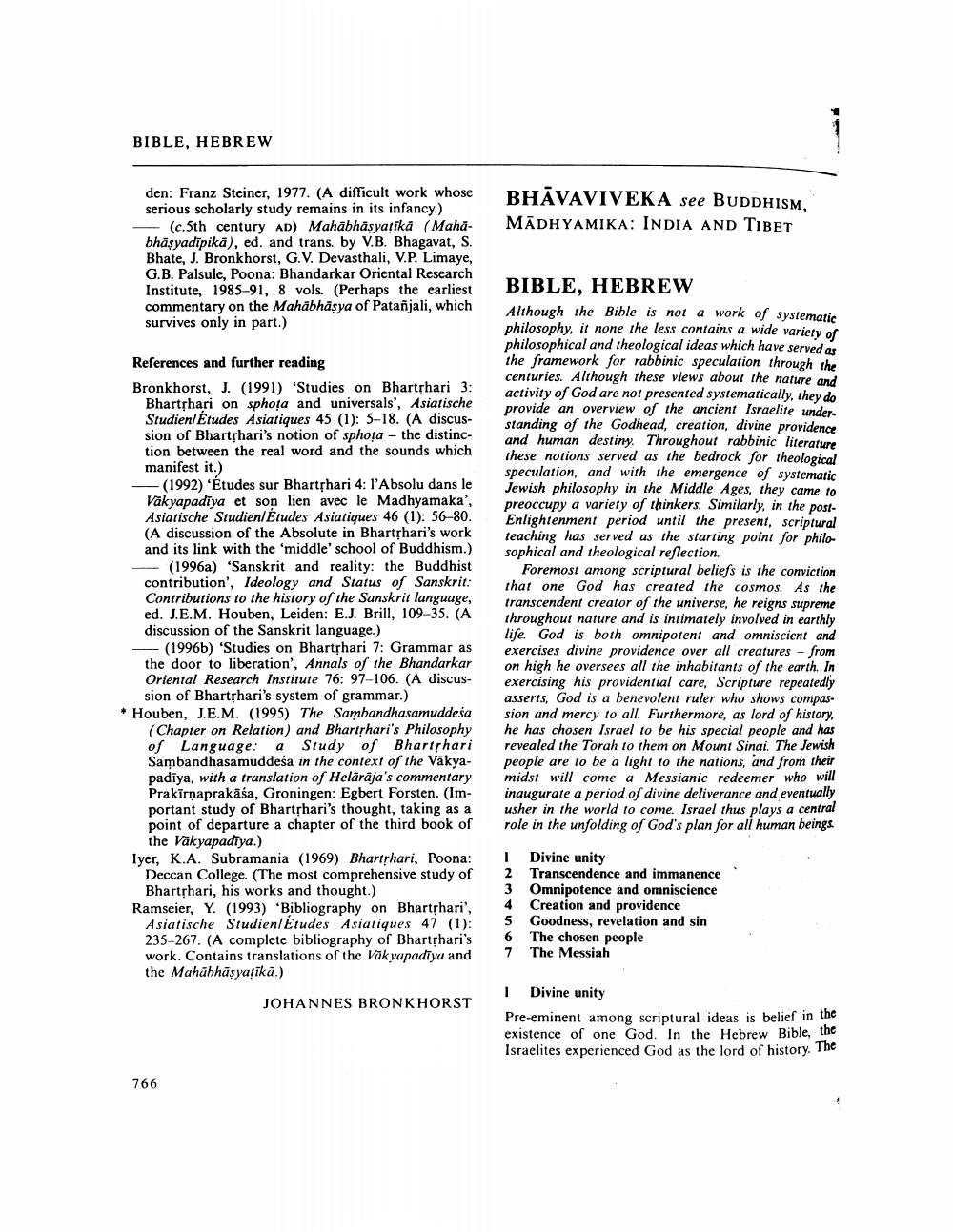________________ BIBLE, HEBREW BHAVAVIVEKA see Buddhism MADHYAMIKA: INDIA AND Tibet den: Franz Steiner, 1977. (A difficult work whose serious scholarly study remains in its infancy.) (c.5th century AD) Mahabhasyatika (Maha ry AD) Mahabhasvatika (Maha- bhasyadipika), ed. and trans. by V.B. Bhagavat, S. Bhate, J. Bronkhorst, G.V. Devasthali, V.P. Limaye, G.B. Palsule, Poona: Bhandarkar Oriental Research Institute. 1985-91, 8 vols. (Perhaps the earliest commentary on the Mahabhasya of Patanjali, which survives only in part.) References and further reading Bronkhorst, J. (1991) 'Studies on Bhartshari 3: Bhartshari on sphota and universals', Asiatische Studien Etudes Asiatiques 45 (1): 5-18. (A discussion of Bhartshari's notion of sphota - the distinction between the real word and the sounds which manifest it.) - (1992) 'Etudes sur Bhartshari 4: l'Absolu dans le Vakyapadiya et son lien avec le Madhyamaka', Asiatische Studienl Etudes Asiatiques 46 (1): 56-80. (A discussion of the Absolute in Bhartshari's work and its link with the 'middle' school of Buddhism.) - (1996a) 'Sanskrit and reality: the Buddhist contribution', Ideology and Status of Sanskrit: Contributions to the history of the Sanskrit language, ed. J.E.M. Houben, Leiden: E.J. Brill, 109-35. (A discussion of the Sanskrit language.) - (1996b) 'Studies on Bhartrhari 7: Grammar as the door to liberation', Annals of the Bhandarkar Oriental Research Institute 76: 97-106. (A discus sion of Bhartshari's system of grammar.) * Houben, J.E.M. (1995) The Sambandhasamuddesa (Chapter on Relation) and Bhartshari's Philosophy of Language: a Study of Bhartrhari Sambandhasamuddesa in the context of the Vakyapadiya, with a translation of Helaraja's commentary Prakirnaprakasa, Groningen: Egbert Forsten. (Important study of Bhartrhari's thought, taking as a point of departure a chapter of the third book of the Vakyapadiya.) Iyer, K.A. Subramania (1969) Bhartshari, Poona: Deccan College. (The most comprehensive study of Bhartshari, his works and thought.) Ramseier, Y. (1993) 'Bibliography on Bhartshari', Asiatische Studien Etudes Asiatiques 47 (1): 235-267. (A complete bibliography of Bhartshari's work. Contains translations of the Vak yapadiya and the Mahabhasyatika.) BIBLE, HEBREW Although the Bible is not a work of systematic philosophy, it none the less contains a wide variety of philosophical and theological ideas which have served as the framework for rabbinic speculation through the centuries. Although these views about the nature and activity of God are not presented systematically, they do provide an overview of the ancient Israelite under. standing of the Godhead, creation, divine providence and human destiny. Throughout rabbinic literature these notions served as the bedrock for theological speculation, and with the emergence of systematic Jewish philosophy in the Middle Ages, they came to preoccupy a variety of thinkers. Similarly, in the postEnlightenment period until the present, scriptural teaching has served as the starting point for philosophical and theological reflection. Foremost among scriptural beliefs is the conviction that one God has created the cosmos. As the transcendent creator of the universe, he reigns supreme throughout nature and is intimately involved in earthly life. God is both omnipotent and omniscient and exercises divine providence over all creatures - from on high he oversees all the inhabitants of the earth. In exercising his providential care, Scripture repeatedly asserts, God is a benevolent ruler who shows compassion and mercy to all. Furthermore, as lord of history, he has chosen Israel to be his special people and has revealed the Torah to them on Mount Sinai The Jewish people are to be a light to the nations, and from their midst will come a Messianic redeemer who will inaugurate a period of divine deliverance and eventually usher in the world to come. Israel thus plays a central role in the unfolding of God's plan for all human beings. 2 Divine unity Transcendence and immanence Omnipotence and omniscience Creation and providence Goodness, revelation and sin The chosen people The Messiah 5 6 7 JOHANNES BRONKHORST I Divine unity Pre-eminent among scriptural ideas is belief in the existence of one God. In the Hebrew Bible, the Israelites experienced God as the lord of history. The 766




